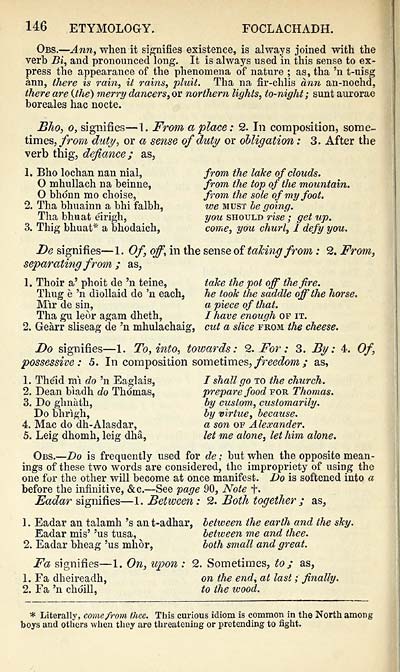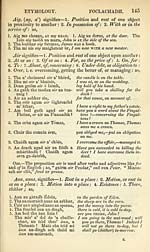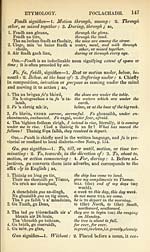Books and other items printed in Gaelic from 1841 to 1870 > Stéidhean a' Ghràmair Ghaëlig
(174) Page 146
Download files
Complete book:
Individual page:
Thumbnail gallery: Grid view | List view

146 ETYMOLOGY. FOCLACHADH.
Obs. — Ann, when it signifies existence, is always joined with the
verb Bi, and pronounced long. It is always used in this sense to ex-
press the appearance of the phenomena of nature ; as, tha 'n t-uisg
ànn, there is rain, it rains, pluit. Tha na fìr-chlis ànn an-nochd,
there are (the) merry dancers, or northern lights, to-night ; sunt aurorae
boreales hac nocte.
JBho, o, signifies — 1. From a place: 2. In composition, some-
times,/rom duty, or a sense of duty or obligation : 3. After the
verb thig, defiance; as,
1. Bho lochan nan nial, from the lake of 'clouds.
O mhullach na beinne, from the top of the mountain.
bhonn mo choise, from the sole of my foot.
2. Tha bhuainn a bhi falbh, we must be going.
Tha bhuat èirigh, you should rise ; get up.
3. Thig bhuat* a bhodaich, come, you churl, t defy you.
De signifìes — 1. Of off, in the sense of taJcing from : 2. From,
separating from ; as,
1. Thoir a' phoit de 'n teine, taìce the pot off the fire.
Thug è 'n dìollaid de 'n each, he took the saddle offthe horse.
Mìr de sin, a piece of that.
Tha gu leòr agam dheth, / have enough op it.
2. Geàrr sliseag de 'n mhulachaig, cut a slice from the cheese.
Do signifies — 1. To, into, towards : 2. For : 3. By : 4. Of
possessive : 5. In composition sometimes, freedom ; as,
1. Thèid mi do 'n Eaglais, / shatt go to the church.
2. Dean bìadh do Thdmas, prepare food for Thomas.
3. Do ghnàth, by custom, customarily.
Do bhrìgh, by virtue, because.
4. Mac do dh-Alasdar, a son of Alexander.
5. Leig dhomh, leig dhà, let me alone, let him dlone.
Obs. — Do is frequently used for de ; but when the opposite mean-
ings of these two words are considered, the impropriety of using the
one for the other will become at once manifest. Do is softened into a
before the infinitive, &c. — See page 90, Note f.
Eadar signifies — 1. Betioeen: 2. Boili together; as,
1. Eadar an talamh 's ant-adhar, between the earth and the sTcy.
Eadar mis' 'us tusa, between me and thee.
2. Eadar bheag 'us mhòr, both small and great.
Fa signifies — 1. On, upon : 2. Sometimes, to ; as,
1. Fa dheireadh, on the end, at last ; finally.
2. Fa 'n choill, to the wood.
* Literally, come/rom thee. This curious idiom is common in the North among
hoys and others when they are threatening or pretending to fight.
Obs. — Ann, when it signifies existence, is always joined with the
verb Bi, and pronounced long. It is always used in this sense to ex-
press the appearance of the phenomena of nature ; as, tha 'n t-uisg
ànn, there is rain, it rains, pluit. Tha na fìr-chlis ànn an-nochd,
there are (the) merry dancers, or northern lights, to-night ; sunt aurorae
boreales hac nocte.
JBho, o, signifies — 1. From a place: 2. In composition, some-
times,/rom duty, or a sense of duty or obligation : 3. After the
verb thig, defiance; as,
1. Bho lochan nan nial, from the lake of 'clouds.
O mhullach na beinne, from the top of the mountain.
bhonn mo choise, from the sole of my foot.
2. Tha bhuainn a bhi falbh, we must be going.
Tha bhuat èirigh, you should rise ; get up.
3. Thig bhuat* a bhodaich, come, you churl, t defy you.
De signifìes — 1. Of off, in the sense of taJcing from : 2. From,
separating from ; as,
1. Thoir a' phoit de 'n teine, taìce the pot off the fire.
Thug è 'n dìollaid de 'n each, he took the saddle offthe horse.
Mìr de sin, a piece of that.
Tha gu leòr agam dheth, / have enough op it.
2. Geàrr sliseag de 'n mhulachaig, cut a slice from the cheese.
Do signifies — 1. To, into, towards : 2. For : 3. By : 4. Of
possessive : 5. In composition sometimes, freedom ; as,
1. Thèid mi do 'n Eaglais, / shatt go to the church.
2. Dean bìadh do Thdmas, prepare food for Thomas.
3. Do ghnàth, by custom, customarily.
Do bhrìgh, by virtue, because.
4. Mac do dh-Alasdar, a son of Alexander.
5. Leig dhomh, leig dhà, let me alone, let him dlone.
Obs. — Do is frequently used for de ; but when the opposite mean-
ings of these two words are considered, the impropriety of using the
one for the other will become at once manifest. Do is softened into a
before the infinitive, &c. — See page 90, Note f.
Eadar signifies — 1. Betioeen: 2. Boili together; as,
1. Eadar an talamh 's ant-adhar, between the earth and the sTcy.
Eadar mis' 'us tusa, between me and thee.
2. Eadar bheag 'us mhòr, both small and great.
Fa signifies — 1. On, upon : 2. Sometimes, to ; as,
1. Fa dheireadh, on the end, at last ; finally.
2. Fa 'n choill, to the wood.
* Literally, come/rom thee. This curious idiom is common in the North among
hoys and others when they are threatening or pretending to fight.
Set display mode to:
![]() Universal Viewer |
Universal Viewer | ![]() Mirador |
Large image | Transcription
Mirador |
Large image | Transcription
Images and transcriptions on this page, including medium image downloads, may be used under the Creative Commons Attribution 4.0 International Licence unless otherwise stated. ![]()
| Rare items in Gaelic > Books and other items printed in Gaelic from 1841 to 1870 > Stéidhean a' Ghràmair Ghaëlig > (174) Page 146 |
|---|
| Permanent URL | https://digital.nls.uk/101713687 |
|---|
| Description | Out-of-copyright books printed in Gaelic between 1631 and 1900. Also some pamphlets and chapbooks. Includes poetry and songs, religious books such as catechisms and hymns, and different editions of the Bible and the Psalms. Also includes the second book ever published in Gaelic in 1631. |
|---|

